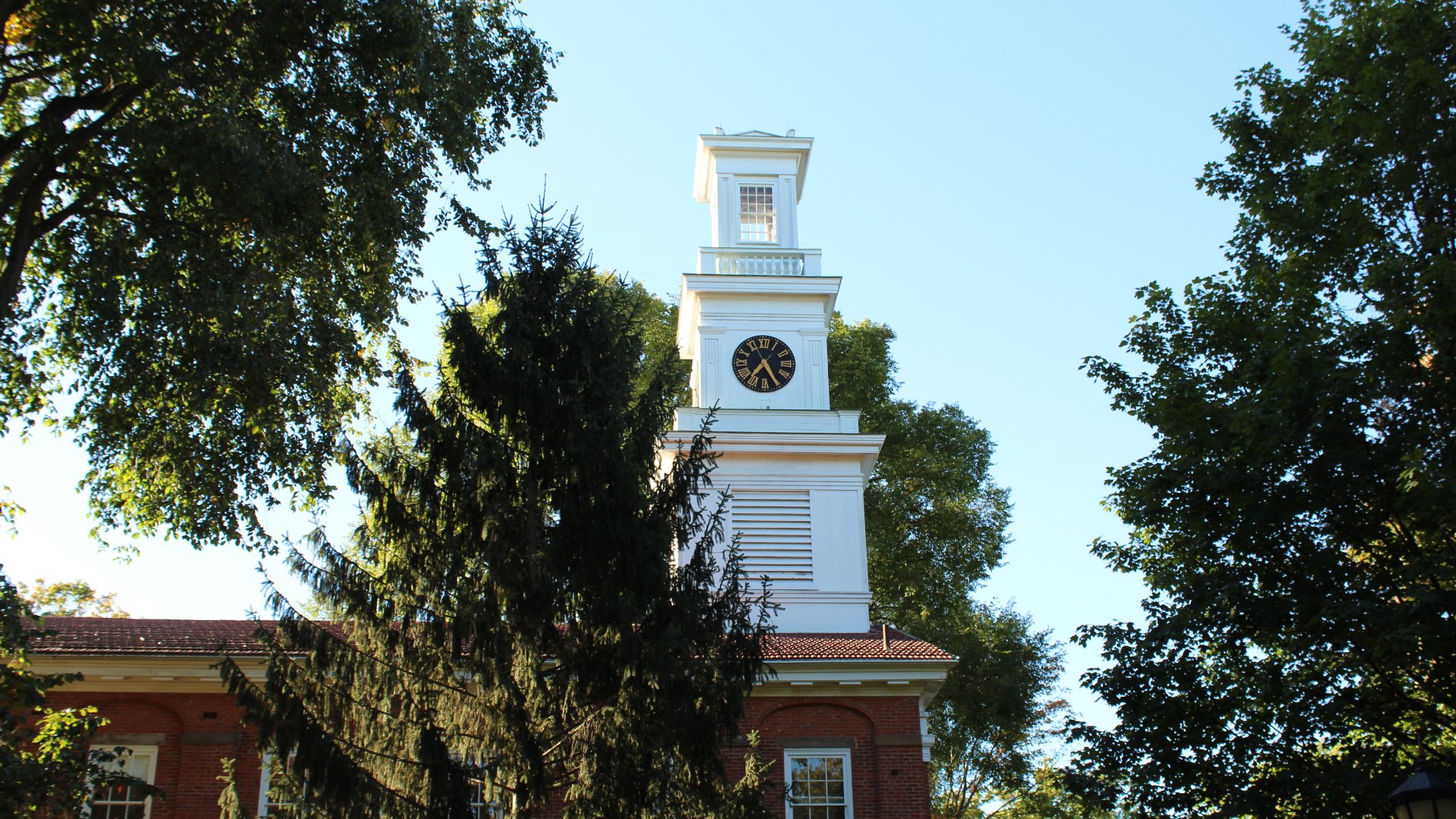Exceptional faculty and staff underpin every great moment at Western Reserve Academy. WRA is a non-sectarian, independent college preparatory boarding and day school, that works diligently to attract and retain the finest faculty and staff by offering competitive salaries and exceptional benefits.
Who We Look For
The excellence of our academics is strengthened every day by our more than 160 faculty and staff members who, in their own unique and diverse ways, bring world-class experience, creativity and passion to their job. We seek candidates who aspire to be their best, support others and want to get involved in our community.

| Please Note: WRA is committed to maintaining an educational and work climate for all members of the community that is free of all forms of discrimination. In particular, WRA strictly prohibits discrimination based on race, sex (including pregnancy), religion, color, age, national origin, veteran and/or military status, genetic information, disability, sexual orientation, gender identity and/or expression, marital status and parental status. |

Teaching at WRA
The heart and soul of the academic program.
Western Reserve Academy’s faculty are talented, dedicated teachers who are fully engaged in boarding school life. Committed to excellence in and out of the classroom, our faculty educate, motivate and guide our students, as well as explore new ways to engage and teach through professional development and collaboration with colleagues.
In recognition of their dedication and excellence, the school offers faculty outstanding benefits. But the best reward for teaching at WRA is the opportunity to engage in a warm community of bright colleagues and students.
Faculty Duties & Responsibilities
WRA strives to find the right balance of duties and responsibilities for each faculty member. Typical expectations:
- Teach five courses, levels to be determined by individual strengths and the needs of the department.
- Participate in the student life program, including dormitory duty.
- Engage in afternoon programs/athletics and weekend activities.
- Serve as an academic advisor for a small group of students.
- Attend school and faculty gatherings.
- Serve on appropriate committees.
Faculty Benefits
Western Reserve Academy’s faculty benefits include the following:
- Competitive salaries.
- On-campus housing. Those who qualify to live in a faculty residence attached to a dormitory do not pay for utilities or Internet service, and, additionally they receive a monthly stipend dependent on dormitory responsibilities.
- Excellent medical and dental benefits.
- Exceptional contributions to TIAA-CREF’s retirement program. Currently, WRA contributes 10 percent of the faculty member's salary to the program.
- A work computer provided for duration of employment, with planned updates from our Technology Office.
- Three meals a day offered to faculty. Families are welcome.
- Use of state-of-the-art athletic facilities, including an indoor track in the field house and a health club-style weight room.
- Tuition remission for qualified faculty children.
- Full-year sabbatical program.
- Moving allowance.
Department Descriptions
English courses at WRA draw students into the realms of literature, language and writing. Classes promote both independent and collaborative effort. Objectives include careful, thoughtful reading, ongoing vocabulary development, engaged class discussion, the application of grammar, and the writing and revision process. Indeed, teachers provide formative feedback on frequent written compositions. Through the English curriculum students develop their capacity to think critically, imaginatively and compassionately, and to express that thinking effectively, even eloquently – in both speaking and writing. The English Department offers four levels of English. The first three years of English embrace common writing goals and a selection of core texts, supplemented by readings chosen by instructors in individual sections. In the fourth year, students enroll in either an integrated, year-long college preparatory course, or two half-year courses exploring topics that reach beyond the scope of typical AP curriculum. Students must take and pass English each year to graduate from WRA.
The Fine & Performing Arts Department offers opportunities for developing creativity and skills through a variety of courses in Dance, Drama, Music, and the Visual Arts. The faculty provides instructional guidance for students interested in an initial exploration in the Arts, and for those who desire in-depth study in any of the four disciplines. We maintain a very active main-stage and repertorial performance calendar, as well as rotating exhibitions of student work in the Moos Gallery. In addition to courses, extra-curricular opportunities exist for students to take part in two plays, and a musical, on stage as actors, or backstage as tech or costume crew members. The overall focus is on teaching students the process, how to work as artists, and how to solve problems with originality and confidence. Students are challenged to find their own artistic path, whether that’s as a practicing artist, or a life-long participant in the Arts.
The Social Science Department’s primary objective is to help students cultivate an understanding of their place within the breadth of human experience. As they learn to interpret historical themes and events, students develop a keen appreciation of the trends of the past and a greater insight into the vital issues of the 21st century. Small class sizes and a collaborative learning approach engender engaged and sometimes heated classroom discussions, as well as an opportunity to share ideas with WRA’s experienced and dedicated faculty. Social science courses at WRA are designed to provide students with extensive knowledge of the subject matter, and the analytical tools needed to make sense of that knowledge.
Other department objectives include:
- Encouraging students’ understanding of the past by addressing where and when history unfolded and by examining the all-important “why” questions in historical evolution.
- Promoting development of analytical abilities, including questioning techniques, formation and validation of hypotheses, and presentation of conclusions and generalizations.
- Fostering certain personal qualities, such as civic responsibility, self-confidence, tolerance and intellectual curiosity.
- Incoming freshmen must take three social science units to graduate from Western Reserve Academy: Ancient World History, Modern World History and U.S. History. College level courses are currently offered in European History, U.S. History, Economics (both macro and micro), Government and Art History. Elective courses include Art History, and topic courses such as Middle Eastern History and Arabic Studies.
The Mathematics Department curriculum at Western Reserve Academy encourages creative exploration and curiosity while providing students with the opportunity to understand big ideas and acquire important knowledge and skills necessary for the development of critical thinking. Our mathematics curriculum is broad and diverse, includes a robust Computer Science sequence, and is designed to provide a balance of both foundational and practical skills.
Western Reserve Academy has a dedicated math faculty with extensive experience in education. Faculty members develop connections with students through small class settings and individual help. Students are encouraged to explore their passions and make connections to their environment and the world around them.
Mathematics course placement for new students at Western Reserve Academy is based on results of a math placement diagnostic, teacher recommendations, math course history, and standardized testing. At WRA, we recognize each student’s unique aptitude and offer many flexible pathways through our mathematics curriculum. Elective courses include Discrete Math, Introduction to Statistics, Financial Math, Learn to Code, and Computer Programming: Python. College Level courses are currently offered in Calculus, Multivariable Calculus, Statistics & Epidemiology, Calculus Based Probability & Statistics, Linear Algebra, and Computer Science. Students are required to successfully complete four years of mathematics to graduate from WRA.
Western Reserve Academy’s Modern & Classical Languages Department offers challenging and interactive courses that demand an advanced level of commitment and energy from students that is commensurate with our experienced faculty. These high standards help our students graduate with a greater appreciation of their role in our global society.
The department maintains these standards in all of its language offerings. For modern languages, the primary focus is on instruction in the target language; classical languages emphasize early introduction and consistent use of authentic Latin literature. The pace of study allows our students to quickly acquire listening, speaking and reading skills, while also engaging students in topics of cultural interest.
WRA’s language curriculum is extensive. Course offerings include multiple levels of French, Spanish, Latin and Mandarin Chinese, as well as College Level courses in all four languages. In addition, we offer Spanish Language and Culture, and conversation courses.
Language students at WRA are exposed to a global view of the world through in-class instruction; cultural activities, both on and off campus; and frequent international travel opportunities, from faculty-led trips to the ELISA program – a fully funded, summer study abroad program that allows students to sharpen their foreign language skills and cultural awareness. Students have traveled to Costa Rica, France, Italy and China.
At WRA, foreign language study promotes mental discipline, enhances the understanding of the structure and inner workings of language in general, expands the vocabulary of the student’s native language and enriches the student’s appreciation of other cultures.
Students are required to complete three years of one language so that they will develop linguistic maturity and steadily acquire the multiple, cumulative skills typical of language learning.
The Science curriculum offers a breadth and depth of exposure in both life and physical science. Courses are available to students of wide-ranging ability and at every grade level. Each course contains a certain core of factual information, but the emphasis is on science as a process of inquiry, facilitated by laboratory experience. The department believes the goal of science instruction at the secondary level should be the development of positive attitudes and interests related to science, an ability to see the world through the lens of science, an understanding of basic concepts, and skill in critical analysis and sequential reasoning. Deep understanding is achieved by engaging prior understanding and by embracing the vital role of factual knowledge within conceptual frameworks.
